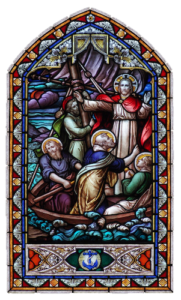News
Peace… be still.
The Gospel reading set for this coming Sunday focusses on the question, “Who is this man Jesus?” This long liturgical season of Sundays following the feast of Pentecost (the Holy Spirit or divine wisdom) invites us to ask that question of ourselves.
 Is Jesus the stained-glass bearded guy that we are familiar with (pictured left), or the person nailed to a cross who seems remote and powerless over the world he is trying to save? Is he an interesting historical figure who left a significant mark on the world, or someone we feel we know and can talk to? What does our imagination engage with, to help us to answer this question in Sunday’s gospel passage? This first gospel photo of Jesus gives us an image of a presence that stills a storm and brings peace and stability to a sinking boat, caught on a violent lake. It is both a reassuring image of Jesus and a disturbing one at the same time.
Is Jesus the stained-glass bearded guy that we are familiar with (pictured left), or the person nailed to a cross who seems remote and powerless over the world he is trying to save? Is he an interesting historical figure who left a significant mark on the world, or someone we feel we know and can talk to? What does our imagination engage with, to help us to answer this question in Sunday’s gospel passage? This first gospel photo of Jesus gives us an image of a presence that stills a storm and brings peace and stability to a sinking boat, caught on a violent lake. It is both a reassuring image of Jesus and a disturbing one at the same time.
Who are the people in our lives that help us feel more secure and still our storms? Who are the people who bring stability and assurance when we are terrified and need it most? Early memories of parents and teachers, clergy and grandparents may help us get in touch with this thematic focus. Or maybe not? We may not have had the security of knowing someone was looking out for us, protecting us, and loving us into a deeper trust in the powers behind the universe and ultimately God.
When we are faced with difficult circumstances where what was known and stable is simply turned upside down, how do we still that storm? How do we cope and catch our breath and have confidence everything will turn out ok? Spiritual practices like prayer, meditation, walking the labyrinth, writing, singing, painting -all help us to still the storms within and around us. As clergy, we often get to hear stories of how Jesus (and the community who follow Jesus) have helped so many of us deal with these tsunami-like events of life. Stories of how God is saving us bring us comfort and inspiration as we all make our way and hope that in “practicing” our faith, we can meet the unknown trials ahead. That is itself a kind of “faith.” To be a practicing Christian is often a repetitive pattern of returning to practices and forms of inner disciplines that can help us when we are suddenly hit by or surprised by these seemingly catastrophic events of life. It is much more difficult to “still the storms” when we simply have no practice or do not feel we need one. Practice helps us to be still, to take inventory rather than flight, to allow support and wisdom to come to us and rest in God’s unchanging and eternal love for us. Paul reminds us “nothing can separate us from the love of God” and goes on to list all the storms of his own experiences.
In a few weeks, we hope the parish and community will return to some form of normalcy (whatever that means these days?). With many of us vaccinated, we have the opportunity to see friends and family and begin to resume a more normal life, including returning to church, worship and fellowship. On Monday, our Vestry will be considering a proposal to meet without masks while continuing to offer outdoor services for those who may not be vaccinated or are continuing to be vigilant against Covid 19 exposure. Attempting to meet herd immunity is not a straight line for any country, and so these summer months offer opportunities to test and try out new adventures as the storms caused by Covid 19 settle down (at least for now). It is important for all of us to enjoy the lull of summer, opportunities to travel and renew our deep relationships, knowing that the Fall may force us to adapt and change our practices and behaviors yet again. We are certainly all still at sea, but I hope the recent call of a new rector, the recent wave of enthusiasm of the Search Committee and Vestry may give us all renewed confidence that the stormy interim period that we have all been through, has given us a deeper appreciation of God’s presence and the support of the St. Paul’s community on a new and unknown adventure. Upon reflection, what were our practices that sustained and centered us, so we got through the past year? How do we keep that “Peace, be still” voice in our distracted and anxious minds? “Who or what is this, that even the winds and seas obey?” Do we trust this presence more, (or less) because of what we have just been through?
Albert J. Ogle
Interim Rector
